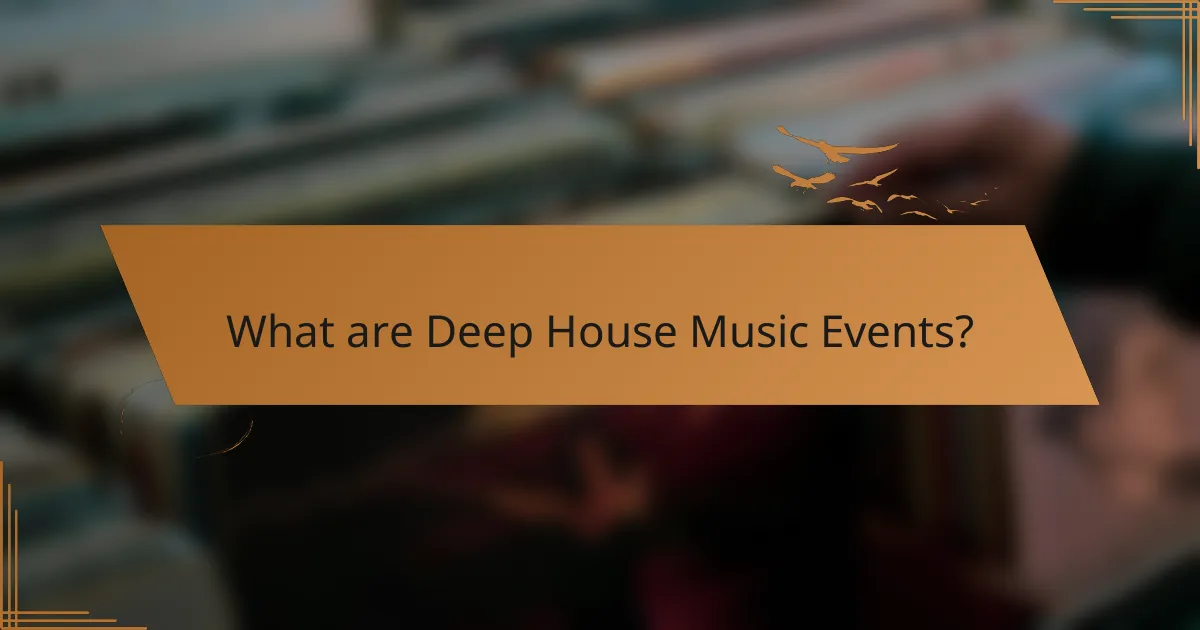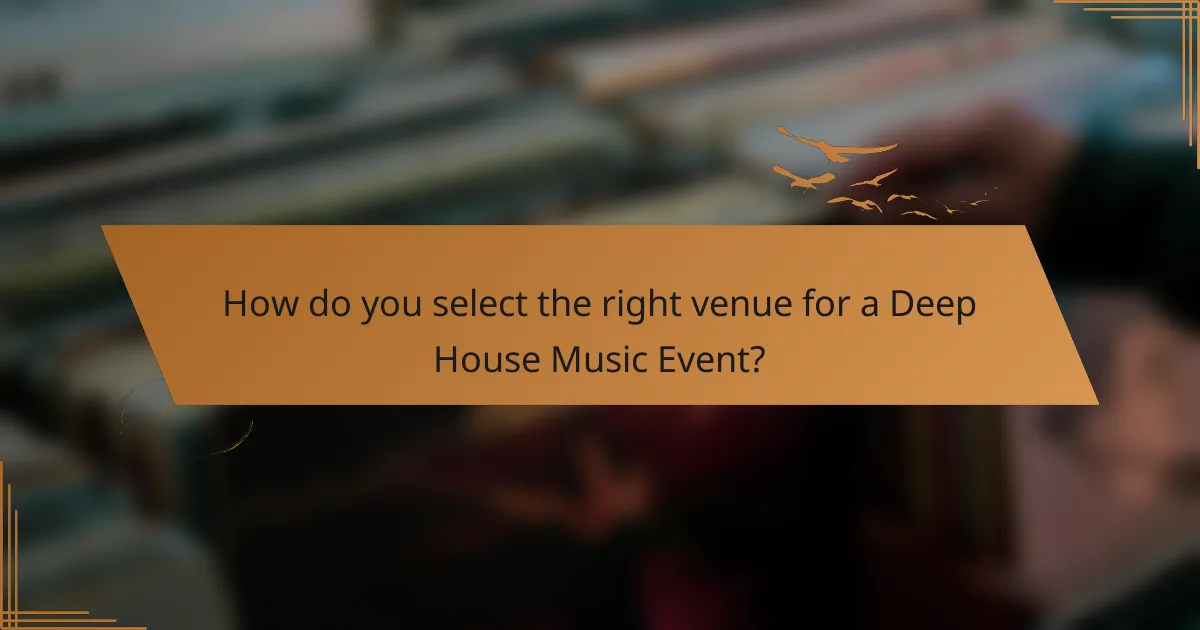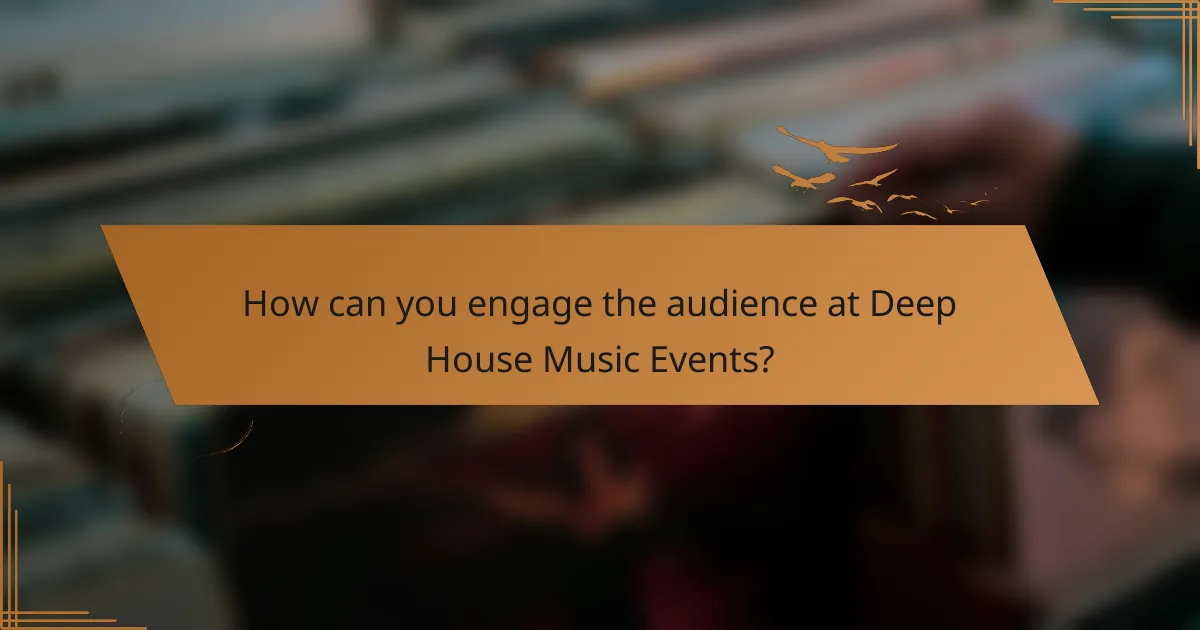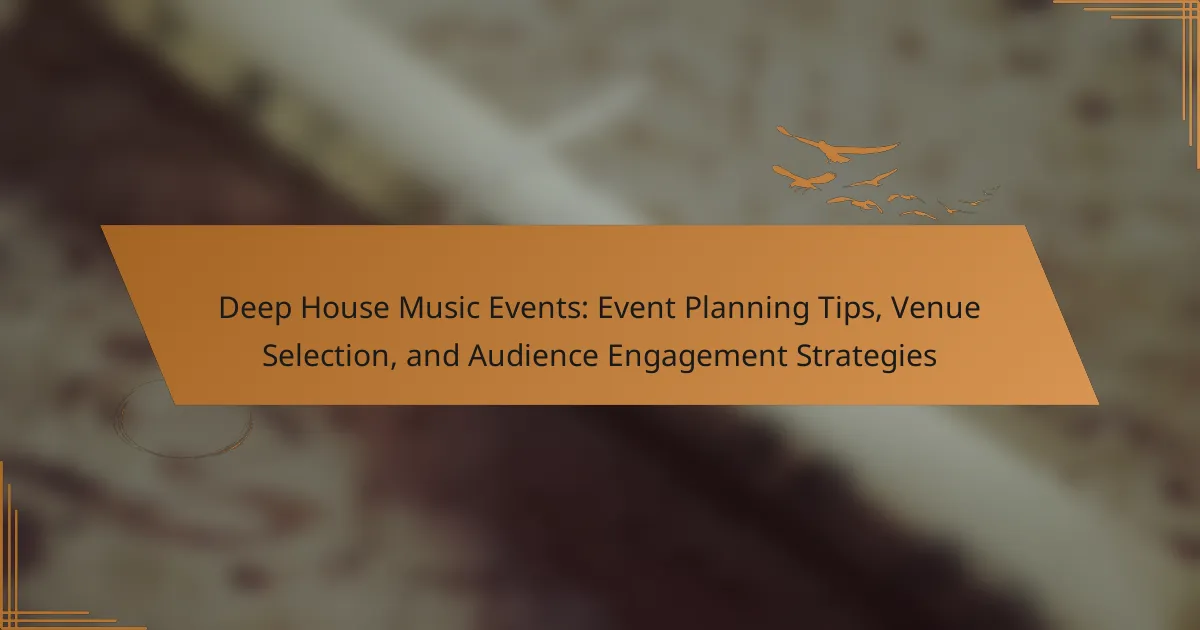Deep House Music Events are gatherings centered around the deep house genre of electronic music, featuring DJs and live performances that highlight soulful melodies and smooth rhythms. This article provides essential insights into planning these events, including venue selection criteria such as capacity, acoustics, and location, which are crucial for creating an immersive experience. Additionally, it outlines strategies for enhancing audience engagement through interactive experiences, visual elements, and social media involvement. By focusing on these aspects, event organizers can foster community and connection among deep house music enthusiasts.

What are Deep House Music Events?
Deep House Music Events are gatherings focused on the deep house genre of electronic music. These events feature DJs and live performances that emphasize soulful melodies and smooth rhythms. They often take place in clubs, festivals, or outdoor venues. The atmosphere is typically relaxed and immersive, catering to fans of the genre. Attendance can vary from small, intimate gatherings to large-scale festivals. Deep house music has roots in the 1980s and has evolved over time. The genre is known for its use of complex chords and deep basslines. These events promote community and connection among music lovers.
How do Deep House Music Events differ from other music events?
Deep House Music Events differ from other music events primarily in their musical style and atmosphere. Deep house is characterized by its smooth, soulful melodies and slower tempos, typically ranging from 120 to 125 BPM. This genre often incorporates elements of jazz, funk, and soul, creating a laid-back vibe.
The audience experience at deep house events is usually more intimate and immersive. These events often focus on creating a relaxed environment, encouraging social interaction and connection among attendees.
In contrast, other music events may prioritize high-energy performances and larger crowds, often featuring faster-paced genres like EDM or pop. The lighting and visual effects at deep house events are typically subtler, enhancing the chill atmosphere without overwhelming the audience.
According to a survey by Resident Advisor, deep house events attract a dedicated fan base that values the genre’s unique sound and community feel. This demographic often seeks a more personal and engaging experience compared to mainstream music events.
What specific elements define a Deep House Music Event?
A Deep House Music Event is defined by its specific musical characteristics, ambiance, and audience engagement. The music typically features soulful vocals, smooth basslines, and complex melodies. Deep house often incorporates elements of jazz, funk, and soul. The event atmosphere is usually intimate and relaxed, encouraging social interaction. Venue selection plays a crucial role, with underground clubs or outdoor spaces being preferred. Lighting is often subdued, enhancing the overall mood without overwhelming the music. Audience engagement is fostered through interactive experiences, such as live performances or DJ sets. These elements combine to create a unique environment that resonates with deep house enthusiasts.
Why is Deep House Music popular among certain audiences?
Deep House Music is popular among certain audiences due to its unique blend of soulful melodies and rhythmic beats. This genre often features deep basslines and smooth vocals, creating an immersive listening experience. Audiences appreciate its ability to evoke emotions and foster a relaxed atmosphere. Deep House Music is frequently played in clubs and festivals, appealing to those seeking a laid-back vibe. According to a 2020 survey by Beatport, 45% of electronic music fans prefer genres like Deep House for their chill and melodic qualities. This popularity is also reflected in streaming data, with Deep House tracks consistently ranking high on platforms like Spotify. The genre’s roots in house music and connection to dance culture further enhance its appeal among fans.
What are the key components of planning a Deep House Music Event?
Key components of planning a Deep House Music Event include venue selection, artist booking, sound and lighting setup, marketing strategy, and event logistics. Venue selection should accommodate the expected audience size and provide an appropriate atmosphere. Artist booking involves securing DJs or producers known for Deep House music to attract attendees. Sound and lighting setup is crucial for creating the right ambiance and enhancing the music experience. Marketing strategy must target the right demographic through social media, flyers, and partnerships. Event logistics include ticketing, security, and staffing to ensure a smooth operation on the event day. Each component plays a vital role in the success of the event.
What role does music selection play in event planning?
Music selection is crucial in event planning as it sets the tone and atmosphere. The right music can enhance guest enjoyment and engagement. It influences attendees’ emotions and behaviors throughout the event. For example, upbeat tracks can energize guests, while mellow sounds can create a relaxed vibe. Research shows that music affects mood and can even impact event duration. A study by the Journal of Consumer Research found that appropriate music increases time spent at an event. Therefore, thoughtful music selection directly contributes to the event’s overall success and guest satisfaction.
How can event themes enhance the Deep House experience?
Event themes can significantly enhance the Deep House experience by creating an immersive atmosphere. A well-defined theme aligns the visual and auditory elements, reinforcing the music’s mood. For instance, a beach theme can incorporate tropical decor and ambient lighting, complementing the laid-back vibes of Deep House. This synergy between theme and music fosters a deeper emotional connection for attendees. Studies have shown that themed environments can elevate participant engagement and satisfaction. This is supported by research from the Journal of Environmental Psychology, indicating that themed events can enhance overall attendee enjoyment and recall of the experience. Thus, event themes play a crucial role in enriching the Deep House experience.
What challenges do organizers face when planning Deep House Music Events?
Organizers face multiple challenges when planning Deep House Music Events. One significant challenge is securing suitable venues that meet sound requirements and capacity needs. Additionally, budget constraints often limit options for high-quality sound equipment and lighting. Coordinating schedules with artists and DJs can also lead to conflicts, impacting event timelines. Marketing the event effectively to attract the target audience poses another hurdle. Furthermore, ensuring compliance with local regulations regarding noise and permits is crucial yet challenging. Managing logistics, including ticket sales and crowd control, adds to the complexity of the planning process. Lastly, creating an engaging atmosphere that resonates with Deep House enthusiasts requires careful consideration of decor and ambiance.
How can budget constraints impact event planning?
Budget constraints significantly impact event planning by limiting available resources. These limitations affect venue selection, catering options, and entertainment choices. Event planners must prioritize essential elements over luxury features. A tighter budget often leads to fewer marketing opportunities, resulting in lower attendance. Cost-cutting measures may compromise the overall quality of the event. Additionally, budget constraints can restrict the timeline for planning and execution. Planners may need to negotiate with vendors for better rates. Ultimately, budget constraints necessitate careful financial management to achieve desired outcomes.
What logistical issues should be considered?
Logistical issues for deep house music events include venue capacity, sound system requirements, and scheduling. Venue capacity must accommodate expected attendance to ensure safety and comfort. Sound system requirements depend on the venue size and acoustics, impacting audio quality. Scheduling involves coordinating performance times, sound checks, and set changes to maintain audience engagement. Transportation logistics for artists, equipment, and attendees must also be organized effectively. Permits and insurance are essential to comply with local regulations and protect against liabilities. Catering and restroom facilities should be adequate to serve the audience. Finally, security measures must be in place to ensure a safe environment for all participants.

How do you select the right venue for a Deep House Music Event?
To select the right venue for a Deep House Music Event, consider factors like capacity, acoustics, and location. A venue should accommodate the expected audience comfortably. Good acoustics enhance the music experience, making it essential for a Deep House event. The location should be accessible to your target audience, ideally in a vibrant area. Check for available amenities such as lighting and sound equipment. Venue availability on your desired date is crucial for planning. Research past events at the venue to gauge suitability. These steps ensure a successful Deep House Music Event.
What factors should be considered when choosing a venue?
Consider location, capacity, and amenities when choosing a venue. The venue’s location should be accessible to your target audience. Proximity to public transport can enhance attendance. Capacity must accommodate expected guests without overcrowding. Adequate space allows for comfort and movement. Amenities include sound systems, lighting, and staging equipment. Quality amenities enhance the overall experience. Additionally, consider the venue’s atmosphere and aesthetic. A fitting ambiance can elevate the deep house music experience. Lastly, budget constraints are crucial in venue selection. Ensure the venue aligns with your financial plan.
How does venue capacity affect the event atmosphere?
Venue capacity significantly impacts the event atmosphere. A larger venue can create a sense of grandeur and openness. However, if the attendance is low, it may feel empty and less engaging. Conversely, a smaller venue fosters intimacy and connection among attendees. This closeness can enhance the emotional experience of the event. High attendance in a smaller space can create a vibrant, energetic atmosphere. Yet, overcrowding may lead to discomfort and reduce enjoyment. Studies show that audience size and density influence perceived energy levels and satisfaction. Thus, selecting the right venue capacity is crucial for achieving the desired atmosphere at deep house music events.
What location characteristics enhance a Deep House Music Event?
A Deep House Music Event is enhanced by location characteristics such as acoustics, ambiance, and accessibility. Good acoustics ensure sound quality, allowing the deep bass and intricate melodies to resonate effectively. The ambiance should align with the deep house vibe, often featuring dim lighting and artistic decor. Accessibility is crucial for attracting a larger audience, including proximity to public transport and parking facilities. Outdoor venues can provide a unique atmosphere, especially if they allow for natural sound enhancement. Historical venues often add a layer of charm, making the event memorable. Each of these characteristics contributes to a more immersive experience for attendees.
What types of venues are best suited for Deep House Music Events?
Intimate clubs and lounges are best suited for Deep House Music events. These venues provide a close atmosphere, enhancing audience engagement. The acoustics in smaller spaces allow for better sound quality, essential for deep house music’s intricate beats. Additionally, venues with dance floors encourage movement and interaction among attendees. Outdoor spaces can also work well, especially during warm weather, providing a relaxed vibe. Venues that support a bar or lounge area allow for socializing, which is a key aspect of deep house culture. Overall, the ideal venue combines a welcoming environment with quality sound and space for dancing.
How do indoor and outdoor venues differ for these events?
Indoor and outdoor venues differ significantly for deep house music events. Indoor venues offer controlled environments, ensuring consistent sound quality and lighting. They protect against weather-related disruptions, providing a comfortable experience for attendees. In contrast, outdoor venues allow for larger crowds and natural ambiance, enhancing the overall atmosphere. However, outdoor venues may face challenges like noise regulations and weather unpredictability. Indoor venues typically have fixed sound systems, while outdoor venues often require portable equipment. The choice between the two impacts logistics, audience experience, and overall event success.
What are the advantages of unique venue spaces?
Unique venue spaces enhance the experience of deep house music events. They provide distinctive atmospheres that engage attendees. Unique venues often have character, adding to the overall ambiance. This can create memorable experiences that encourage repeat attendance. Additionally, these venues can attract diverse audiences looking for something different. According to a study by Eventbrite, 74% of attendees prefer unique venues for events. This preference can lead to increased ticket sales and higher engagement. Unique venues also often come with built-in marketing opportunities due to their distinctive nature.

How can you engage the audience at Deep House Music Events?
Engaging the audience at Deep House Music events can be achieved through interactive experiences. Utilize visuals like LED screens to enhance the atmosphere. Create a comfortable space for attendees to socialize and relax. Incorporate live performances or guest DJs to keep the energy high. Offer unique merchandise or giveaways to create excitement. Engage the audience through social media before and during the event. Encourage audience participation with dance contests or interactive polls. Provide a well-curated playlist that resonates with the Deep House genre. These strategies can significantly enhance audience engagement and overall event satisfaction.
What strategies can enhance audience participation?
Engaging the audience effectively can be achieved through various strategies. Interactive activities, such as live polls or Q&A sessions, encourage participation. Social media integration allows attendees to share their experiences in real-time. Incentives, like giveaways or exclusive content, motivate audience involvement. Creating a welcoming atmosphere fosters connections among attendees. Utilizing visual aids can enhance understanding and retention of information. Personalized communication before and during the event increases engagement. Feedback mechanisms post-event help refine future strategies. Implementing these strategies can significantly boost audience participation at deep house music events.
How can interactive elements be integrated into the event?
Interactive elements can be integrated into deep house music events through various methods. Incorporating live polls allows attendees to vote on tracks or setlists in real-time. This engages the audience and personalizes their experience. Utilizing social media walls encourages participants to share their moments, fostering a sense of community. Interactive art installations can also enhance the atmosphere, giving guests a creative outlet. Additionally, offering workshops or dance classes before the main event can involve attendees more deeply. Gamification elements, such as scavenger hunts or contests, can further increase engagement. These strategies have been shown to improve attendee satisfaction and retention at music events.
What role does social media play in audience engagement?
Social media serves as a vital tool for audience engagement. It allows event organizers to connect directly with their audience. Platforms like Facebook, Instagram, and Twitter facilitate real-time communication. Social media enables sharing of event updates, behind-the-scenes content, and promotional materials. This immediacy fosters a sense of community among attendees. According to a study by Eventbrite, 93% of event creators use social media to promote their events. Engaging content on social media can lead to increased ticket sales and higher attendance rates. Social media also provides valuable feedback through comments and shares, helping organizers refine their strategies.
How can feedback be utilized to improve future events?
Feedback can be utilized to improve future events by systematically collecting and analyzing participant responses. Gathering feedback through surveys or interviews allows event organizers to understand attendee experiences. This data reveals strengths and weaknesses in event execution. For instance, 70% of attendees may express dissatisfaction with venue acoustics. Addressing such concerns can enhance sound quality in future events. Additionally, feedback can identify popular features, such as specific DJs or activities. This information helps in planning more appealing lineups. Implementing changes based on feedback fosters a better connection with the audience. Continuous improvement through feedback ultimately leads to higher satisfaction rates and increased attendance.
What methods can be used to gather audience feedback?
Surveys and questionnaires are effective methods to gather audience feedback. They can be distributed online or in-person during events. Feedback forms can be placed at venues for immediate responses. Social media polls engage audiences directly and encourage participation. Focus groups allow for in-depth discussions about experiences. Interviews provide personalized insights and detailed opinions. Analyzing online reviews helps understand audience perceptions. Event apps can facilitate real-time feedback collection during events.
How can feedback influence future Deep House Music Events?
Feedback can significantly influence future Deep House Music events by shaping programming and enhancing audience experience. It allows organizers to understand attendee preferences and expectations. For instance, surveys post-event can reveal which artists were most enjoyed. This data can guide booking decisions for future lineups. Additionally, feedback on venue logistics can identify areas for improvement. If attendees report long wait times, organizers can adjust staffing accordingly. Engaging with feedback fosters a sense of community among attendees. This approach can lead to increased loyalty and repeat attendance at future events. Overall, utilizing feedback creates a more tailored and successful event experience.
What are the best practices for promoting a Deep House Music Event?
Utilizing social media platforms is essential for promoting a Deep House Music event. Create engaging content that highlights the artists, venue, and atmosphere. Utilize event pages on platforms like Facebook to reach a wider audience. Collaborate with local influencers to increase visibility and attract attendees. Utilize targeted ads to reach specific demographics interested in Deep House music. Leverage email marketing to keep your audience informed and engaged. Offer early bird tickets or group discounts to incentivize purchases. Partner with local businesses for cross-promotion to expand your reach. Engaging visuals and videos from past events can enhance promotional efforts.
How can partnerships with local businesses enhance promotion?
Partnerships with local businesses can enhance promotion by leveraging their established customer base. Collaborating with these businesses allows for cross-promotion, reaching a wider audience. For example, a local café could display event flyers, attracting its patrons. Additionally, joint marketing efforts, such as social media campaigns, can amplify visibility. Local businesses often have a loyal following, which can drive attendance to events. According to a study by the National Federation of Independent Business, 70% of consumers prefer to support local businesses. This preference can translate into increased ticket sales and engagement for events. Overall, partnerships create mutual benefits, enhancing promotional efforts for both entities involved.
What digital marketing strategies are most effective for event promotion?
Social media marketing is one of the most effective digital marketing strategies for event promotion. Platforms like Facebook, Instagram, and Twitter allow for targeted advertising. These platforms enable event organizers to reach specific demographics. Email marketing is also crucial for engaging past attendees. Personalized invitations can increase attendance rates. Content marketing, including blogs and videos, builds excitement and informs potential attendees. Influencer partnerships can amplify reach and credibility. Event listing websites enhance visibility and attract more participants. Data analytics helps optimize marketing efforts by tracking engagement and conversion rates.
Deep House Music Events are gatherings centered around the deep house genre of electronic music, characterized by soulful melodies and smooth rhythms. This article provides an overview of key aspects related to planning these events, including venue selection, artist booking, sound and lighting setup, and effective marketing strategies. It also explores audience engagement techniques, such as interactive elements and social media integration, while addressing logistical challenges and budget constraints faced by organizers. Additionally, the article highlights the importance of feedback in improving future events and discusses the role of partnerships with local businesses in enhancing promotional efforts.
